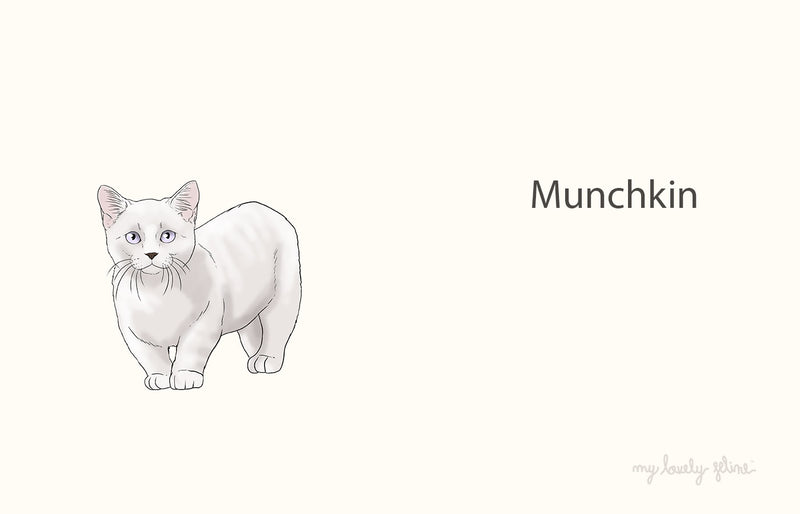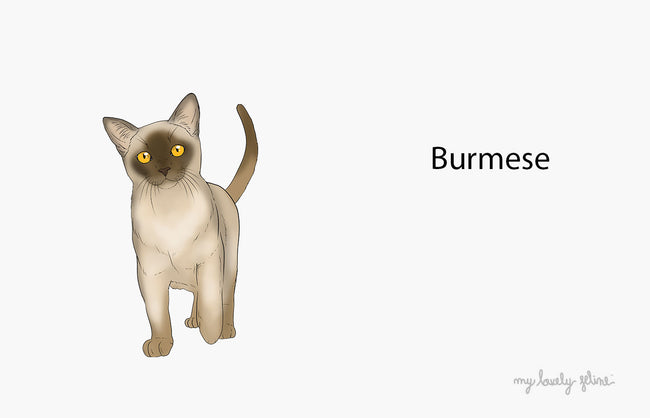|
These little felines are known for their unique physical appearance, with short legs that give them a distinctive and adorable waddle. But there's more to these cats than just their cute looks. Munchkin cats are also known for their playful and affectionate personalities, making them the perfect addition to any family. In this article, we'll delve deeper into the world of Munchkin cats and explore what makes them such a beloved and fascinating breed. From their history and origins to their personality traits and care requirements, we'll cover everything you need to know about these charming little cats. So, get ready to unleash the cuteness and discover all about the Munchkin cat breed! |
History and Origin of the Munchkin Cat Breed
The Munchkin cat breed is a relatively new breed that was first discovered in 1991 in Louisiana, USA. It is named after the Munchkin people from the Wizard of Oz, as the breed's most distinctive feature is its short legs. The breed was created through a natural genetic mutation, and it quickly gained popularity due to its unique appearance and playful personality.
Despite being a relatively new breed, Munchkin cats have a fascinating history. The short-legged mutation has been observed in cats for centuries, but it was not until the early 20th century that breeders began to selectively breed for the trait. However, these early attempts at breeding short-legged cats were unsuccessful, and the breed was not recognized until the 1990s.
Physical Characteristics and Unique Traits of Munchkin Cats
The most distinctive feature of Munchkin cats is their short legs, which are caused by a genetic mutation called achondroplasia. This mutation affects the development of the cat's bones, resulting in short legs that give them a unique and adorable waddle.
Munchkin cats come in a variety of colors and patterns, including solid colors, tabbies, and points. They have medium-sized bodies, with a rounded head, large ears, and expressive eyes. Munchkin cats are typically between 6-9 inches tall at the shoulder and weigh between 5-9 pounds, making them a small to medium-sized breed.
Despite their short legs, Munchkin cats are surprisingly agile and athletic. They are excellent climbers and love to play, making them a perfect indoor companion.
Personality and Temperament of Munchkin Cats
Munchkin cats are known for their playful and affectionate personalities. They have a curious nature and love to explore their surroundings, often getting into mischief along the way. They are also highly social and crave attention and affection from their owners.
Due to their playful nature, Munchkin cats get along well with children and other pets. They are also highly adaptable and can thrive in any living situation, whether it be a small apartment or a large family home.
One thing to keep in mind is that Munchkin cats are highly energetic and require plenty of mental and physical stimulation. They are not a breed that likes to be left alone for long periods, so if you work long hours, it may be best to consider adopting a second cat to keep them company.
Common Health Issues That Munchkin Cats May Face
Like all cat breeds, Munchkin cats are prone to certain health issues. The most common health concern for Munchkin cats is spinal problems, which can result from their short legs. However, not all Munchkin cats will experience these issues, and proper breeding practices can help to reduce the risk.
Other health concerns that Munchkin cats may face include dental problems, obesity, and heart disease. To ensure that your Munchkin cat stays healthy, it is important to provide them with a balanced diet, regular exercise, and routine veterinary care.
Feeding and Grooming Tips for Munchkin Cats
Munchkin cats have a healthy appetite and love to eat, so it is important to monitor their food intake to prevent obesity. A balanced diet that is high in protein and low in carbohydrates is recommended for Munchkin cats, and it is important to provide them with fresh water at all times.
When it comes to grooming, Munchkin cats require minimal maintenance. Their short coats do not tangle easily, and they seldom require brushing. However, it is important to keep their nails trimmed to prevent them from getting too long.
Hydration
Hydration plays a vital role in maintaining the health and well-being of Munchkin cats, just like any other feline. Adequate hydration is essential for various bodily functions, organ health, digestion, and overall vitality. Here are some key reasons why ensuring proper hydration is important for Munchkin cats:
Kidney Function: Optimal hydration is crucial for supporting the healthy functioning of the kidneys in Munchkin cats. It helps to flush out toxins, maintain proper kidney filtration, and reduce the risk of urinary tract issues.
Digestive Health: Adequate hydration promotes healthy digestion in Munchkin cats. It helps to prevent constipation and supports smooth digestion, aiding in the absorption of nutrients from their food.
Preventing Dehydration: Munchkin cats, like many other cats, may not have a strong natural thirst drive. As a responsible pet owner, it is essential to provide them with access to fresh water at all times to prevent dehydration. Dehydration can lead to serious health problems, including urinary tract complications and organ damage.
Energy Levels and Vitality: Hydration directly impacts the energy levels and overall vitality of Munchkin cats. When properly hydrated, they are more active, alert, and better equipped to engage in play and exercise. It helps to keep their muscles and joints lubricated and functioning optimally.
Preventing Urinary Tract Issues: Ensuring proper hydration helps to reduce the risk of urinary tract problems in Munchkin cats, such as urinary crystals or stones. Sufficient water intake helps to dilute urine, maintain urinary tract health, and prevent blockages.
Monitoring Hydration Levels: It is important to monitor the hydration levels of your Munchkin cat. Signs of dehydration can include dry gums, sunken eyes, lethargy, and reduced skin elasticity. If you suspect dehydration, it is crucial to seek veterinary attention promptly.
To ensure your Munchkin cat stays properly hydrated, provide them with fresh, clean water at all times. You can also incorporate wet food into their diet, which has higher moisture content. Encourage water intake by offering water in various locations around the house and consider using a cat water fountain, as cats are often attracted to flowing water.
Training and Socialization for Munchkin Cats
Munchkin cats are highly intelligent and can be easily trained using positive reinforcement techniques. They respond well to praise and treats, making them a joy to train.
Socialization is also essential for Munchkin cats. They are highly social creatures and require plenty of interaction with their owners to thrive. It is important to provide them with plenty of toys and playtime, as well as access to scratching posts and other forms of enrichment.
Munchkin Cats in Pop Culture and Media
Munchkin cats have become increasingly popular in pop culture and media in recent years. They have been featured in numerous films and TV shows, including Captain Marvel, The Big Bang Theory, and The Simpsons.
Munchkin cats have also gained a large following on social media, with many Instagram and YouTube accounts dedicated to these adorable felines. They have even become a popular subject for memes and viral videos!
Pros and Cons of Owning a Munchkin Cat
As with any pet, there are pros and cons to owning a Munchkin cat. On the positive side, they are incredibly cute and playful, making them a joy to be around. They are also highly adaptable and get along well with children and other pets.
On the negative side, Munchkin cats can be prone to certain health issues, and they require plenty of attention and interaction to thrive. They are not a breed that likes to be left alone for long periods, so if you work long hours, it may be best to consider adopting a second cat to keep them company.
How to Find and Adopt a Munchkin Cat
If you're interested in adopting a Munchkin cat, there are a few things to keep in mind. First, it is important to do your research and find a reputable breeder or rescue organization. Look for breeders who prioritize the health and well-being of their cats, and avoid those who breed for extreme physical traits.
You can also consider adopting a Munchkin cat from a local animal shelter or rescue organization. Many cats end up in shelters due to circumstances beyond their control, and they can make wonderful and loving companions.
Munchkin Cat FAQ
What is a Munchkin cat?
A Munchkin cat is a breed known for its short legs, resulting from a natural genetic mutation. Despite their shorter stature, Munchkin cats are agile, playful, and full of personality.
How did Munchkin cats get their short legs?
Munchkin cats have a genetic mutation that affects their leg length. This natural mutation occurred spontaneously and has been selectively bred to develop the Munchkin breed.
Are Munchkin cats healthy despite their short legs?
Munchkin cats are generally healthy and can live a normal lifespan. However, it's important to choose a responsible breeder who prioritizes overall health and doesn't promote excessive breeding for extremely short legs, as it may lead to potential health issues.
Can Munchkin cats jump and climb with their short legs?
Despite their shorter legs, Munchkin cats are surprisingly agile and can jump and climb like any other cat. They have adapted to their unique body structure and can perform typical feline behaviors with ease.
Are Munchkin cats suitable for families with children and other pets?
Munchkin cats are known for their friendly and sociable nature, making them generally good companions for families, including children and other pets. Proper introductions and socialization are important for creating harmonious relationships.
Do Munchkin cats require special care or accommodations due to their short legs?
Munchkin cats do not require any specific care or accommodations solely based on their leg length. They can live a normal cat's life, but it's always important to provide them with a safe and stimulating environment to prevent injuries.
Are there any health concerns associated with Munchkin cats?
While Munchkin cats can be generally healthy, they may be prone to certain health issues like lordosis (excessive spinal curvature) or potential joint problems. It's crucial to choose a reputable breeder who prioritizes the overall health of their cats and conducts necessary health screenings.
Can Munchkin cats participate in cat shows and competitions?
Munchkin cats are accepted in some cat registries and can participate in cat shows and competitions, except in organizations that prohibit breeds with specific physical traits. The breed is recognized and celebrated for its unique appearance and engaging personality.
What is the average lifespan of a Munchkin cat?
Munchkin cats have a similar lifespan to other cat breeds, averaging between 12 to 15 years or longer with proper care, nutrition, and a healthy lifestyle.
Are Munchkin cats purely bred with short legs, or can they have long-legged offspring?
Munchkin cats can have both short-legged and long-legged offspring, as the leg length trait is determined by a dominant gene. When bred with a non-Munchkin cat, the resulting litter may include kittens with either short or long legs, depending on the inheritance of the gene.
Conclusion
Munchkin cats are a unique and fascinating breed that has captured the hearts of cat lovers around the world. With their adorable waddle and playful personalities, they make the perfect companion for anyone looking for a cute and affectionate feline friend. By understanding their history, origins, and care requirements, you can provide your Munchkin cat with the love and attention they deserve. So, what are you waiting for? Unleash the cuteness and adopt a Munchkin cat today!




